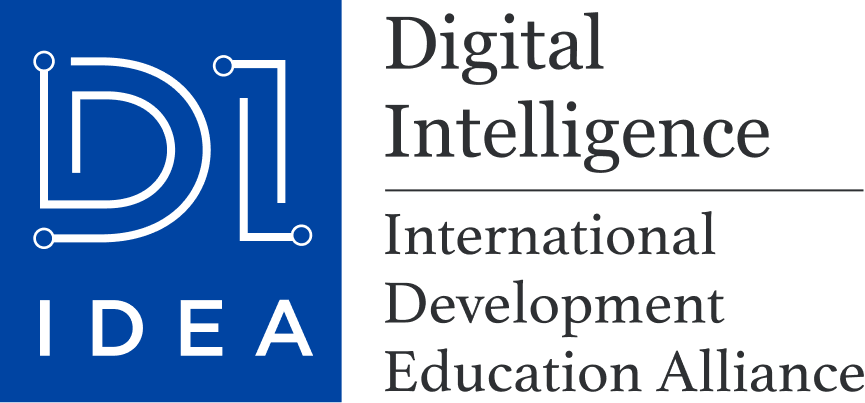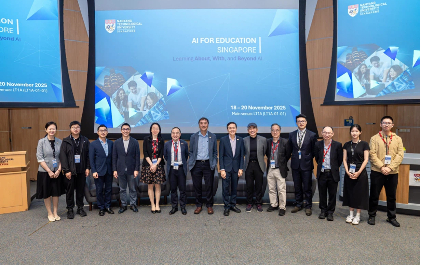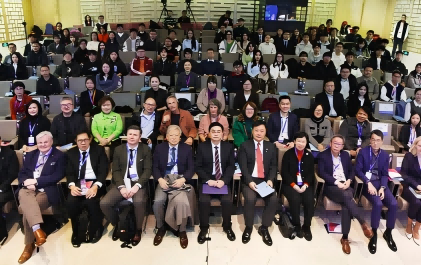From April 3 to 4, the academic conference “Global Approaches to Generative AI in Higher Education,” co-hosted by the London School of Economics and Political Science (LSE) and Peking University (PKU), was successfully held at LSE in the UK. The event was organized under the framework of Digital Intelligence International Development Education Alliance (DI-IDEA, https://diidea.pku.edu.cn), with participation of 100 experts and scholars representing 31 member universities and institutions from countries such as the UK, the US, and Singapore. Wang Bo, Vice Chairman of DI-IDEA, Vice President and Provost of PKU, led the university’s delegation to attend the conference.
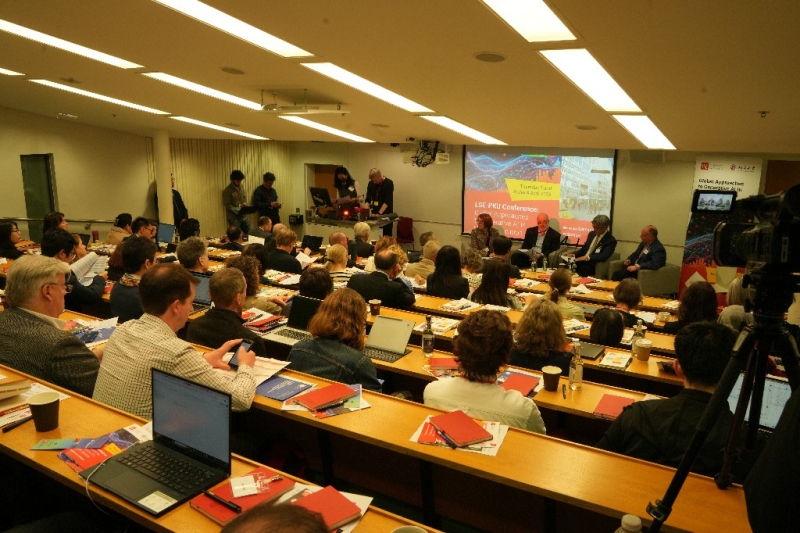
Conference opening
On the morning of April 3, Larry Kramer, President of LSE, and Wang Bo, Vice President of PKU, delivered welcoming remarks at the opening ceremony. Wang Bo highlighted that since its establishment over a year ago, DI-IDEA has explored new paths for digital intelligence education and innovative talent development through seminars, joint research, and platform development. Taking PKU as an example, he introduced initiatives such as launching general education courses and lecture series on AI, developing AI-powered teaching tools, and conducting research on AI applications concerning ethics and legal issues. Emphasizing that technology must empower but not dominate education, he warned against over-reliance on AI at the cost of critical thinking and shared the educational philosophy: “Stay true to the essence of education in cultivating talent,” “Chips are important, but hearts and minds are more important,” and “Truth does not automatically emerge from data.” He concluded by inviting more global universities to join DI-IDEA, collaborate with PKU to address the evolving challenges in higher education, and jointly contribute wisdom and strength to the development of human society.

Opening ceremony
The keynote panel, titled “What is Digital Intelligence?”, was chaired by Larry Kramer. Speakers included Jaeho Yeom, President of Taejae University, Qin S. Joe President of Lingnan University Hong Kong, and Ravi Pendse, Vice President of University of Michigan, who shared diverse insights on the core concepts of digital intelligence.
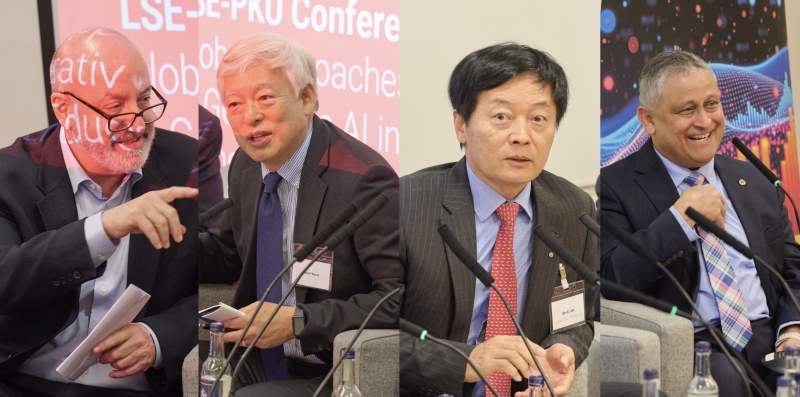
From left to right: Larry Kramer, Jaeho Yeom, Qin S. Joe, and Ravi Pendse
Mairead Pratschke, Chair of Digital Education at the University of Manchester and author of Generative AI in Education: Digital Pedagogies, Teaching Innovation and Learning Design, delivered a keynote speech titled “Living, Learning and Working with Intelligent Machines.”
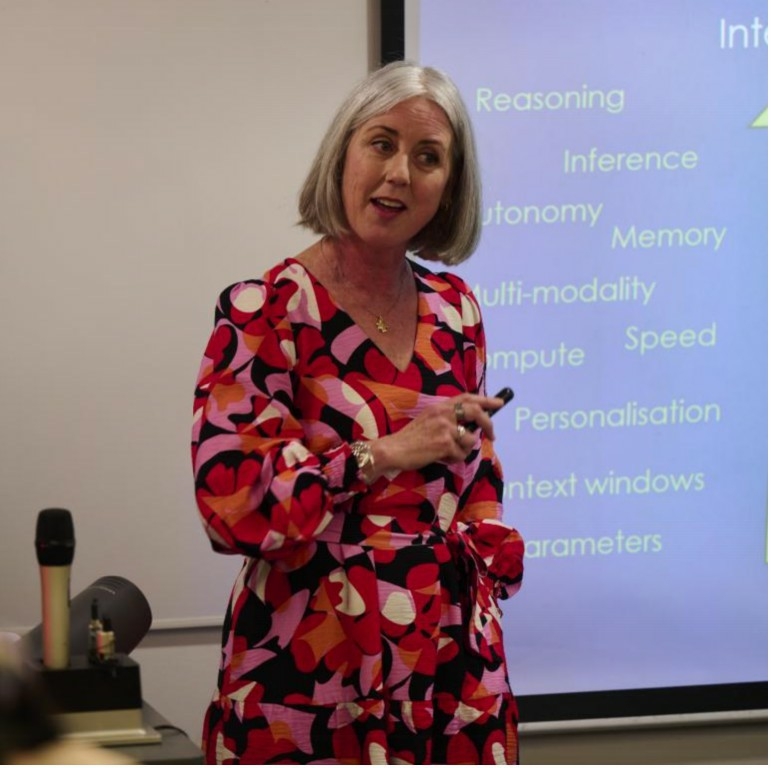
Mairead Pratschke delivered a keynote speech
On the afternoon of April 3, LSE and PKU jointly released initial findings of collaborative research project “Teacher Perceptions on the Use of Generative AI in Education.” Li Guiquan, Associate Professor at the School of Psychological and Cognitive Sciences at PKU, Simon Walker, Assessment Lead Consultant at LSE, and student partners participated in the discussion.
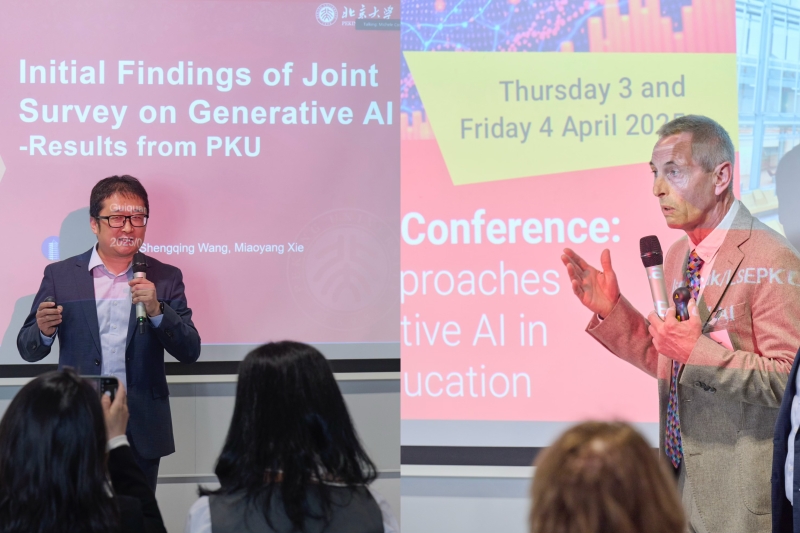
Li Guiquan (left) and Simon Walker (right)
In Panel “Skilling, Deskilling and Reskilling in the Age of AI,” Elena Magrini (Head of Global Research at Lightcast), Emily Osborn (Deputy Dean of the Office of Research and Teaching Innovations at the University of Chicago), Julia Chen (Director of Educational Development Centre at the Hong Kong Polytechnic University), and Jeni Brown (Head of LSE’s Digital Skills Lab) explored how AI is reshaping skills in higher education.
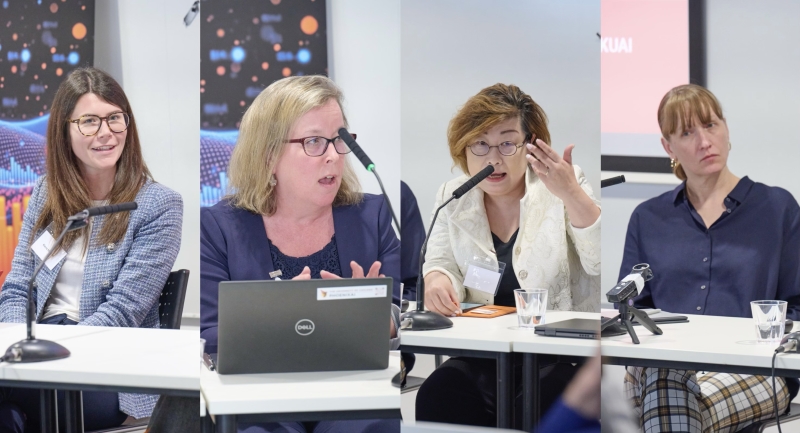
From left to right: Elena Magrini, Emily Osborn, Julia Chen and Jeni Brown
In the following session, experts shared insightful perspectives. Pavlos Protopapas (Professor of the School of Engineering and Applied Science at Harvard University) delivered a speech titled “Unleashing Generative AI: Advancing Education and Scientific Exploration.” Robin Paige (Executive Director of the Center for Teaching and Learning at the University of Chicago) explored the topic of “Teaching and Learning in the Global AI Landscape: Challenges and Opportunities.” Ho Shen Yong (Executive Director of the Institute of Pedagogical Innovation, Research and Excellence at Nanyang Technological University Singapore) introduced “Education Innovation at NTU.” Tong Meng (Deputy Director of the Center for Excellent Teaching and Learning at PKU) shared the achievements of PKU in digital education with a presentation titled “Human-AI Collaboration: The Practice and Future of the PKUQUEST Platform.” The session was chaired by Zhang Ying, Deputy Secretary-General of DI-IDEA and Deputy Dean of the Guanghua School of Management at PKU.
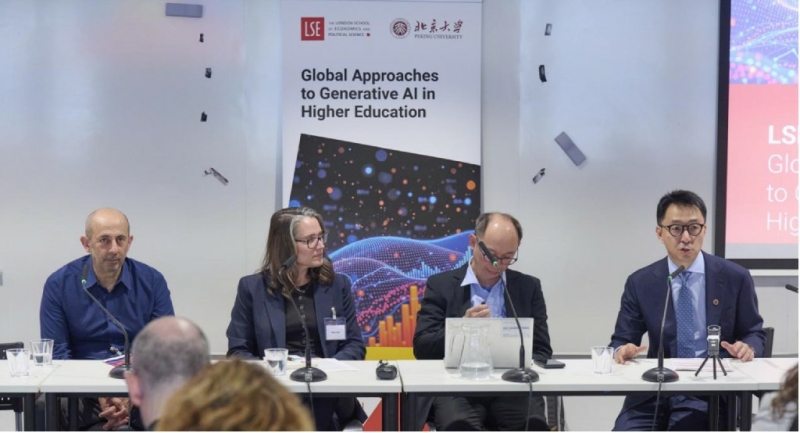
Session group picture
In the special report of “Institutional Approaches to Generative AI in Higher Education in the United Kingdom,” Alan Spivey (Professor of Synthetic Chemistry at Imperial College), Kate Borthwick (Professor of Digital Education at the University of Southampton), Claire Gordon (Director of the Eden Centre at LSE), and Sam Smidt (Director of the King’s Academy at King’s College London) shared their practical experiences.
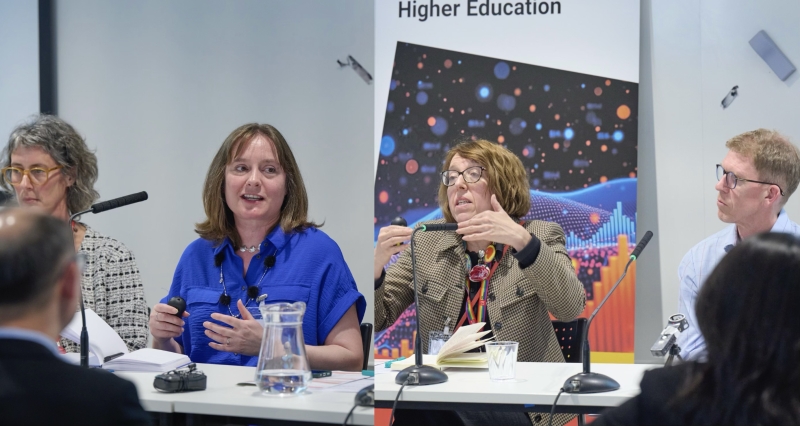
From left to right: Sam Smidt, Kate Borthwick, Claire Gordon and Alan Spivey
On the morning of April 4, Emma Brunskill, Associate Professor of the Computer Science Department at Stanford University, delivered a keynote speech titled “Amplifying Achievement with Generative AI.”
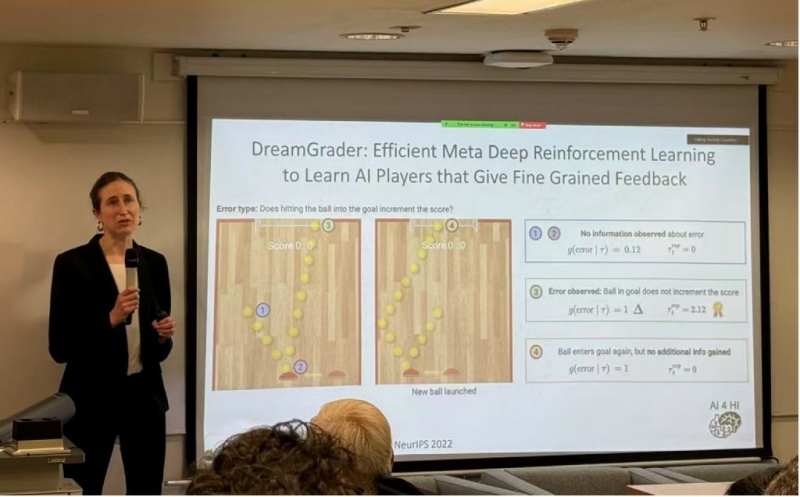
Emma Brunskill delivered a keynote speech
In the following session, Allison Littlejohn (Pro Vice Provost for the Data Empowered Societies Grand Challenge at University College London) explored “AI in the Higher Education Workplace: Vulnerabilities, Negotiations and Sacrifice”; David Lefevre (Professor of the Department of Management and Entrepreneurship at Imperial College) explained “Pedagogical AI: Interfaces for Effective Learning”; Alison Powell (Associate Professor of the Department of Media and Communications at LSE) shared “Building to Critical Thinking: Future-proofed pedagogy”; Veli Hillman (Visiting fellow of the Department of Media and Communications at LSE) discussed “Governing AI in Higher Education: ethics, accountability and trust in intelligent systems”.
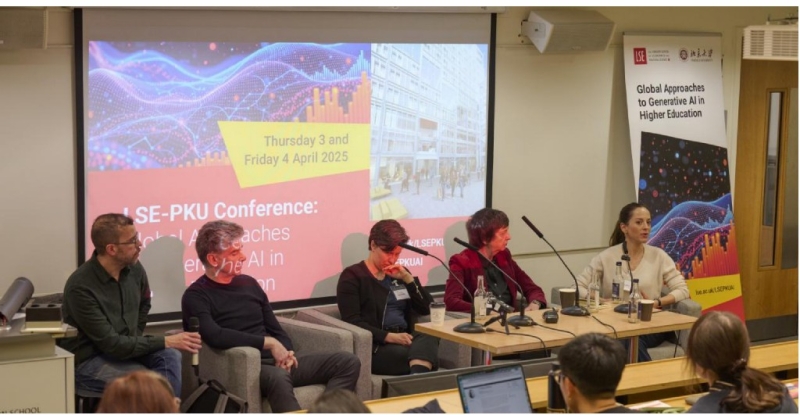
Session group picture
At noon on April 4, DI-IDEA officially launched the 2nd Global Digital Intelligence Education Innovation Competition, with Zhang Ying hosting. Sun Hua, Secretary-General of DI-IDEA, Director of Center for Excellent Teaching and Learning and Director of Office of the Provost at PKU, reviewed the six innovative features of the first competition -- international collaboration, global participation, multi-track architecture design, industry-academia support, high-standard reward mechanism, and business incubation path. He also presented plans for building an open cooperative system “DI-IDEA+,” to strengthen global resource sharing in digital intelligence education. Zhang Linfeng (Founder & Chief Scientist of DP Technology Co., Ltd) and Patrick Carmichael (Managing Director of Camtree at the University of Cambridge) offered expert insights into the “AI for Science” and “AI for Education” tracks and encouraged broad global participation.
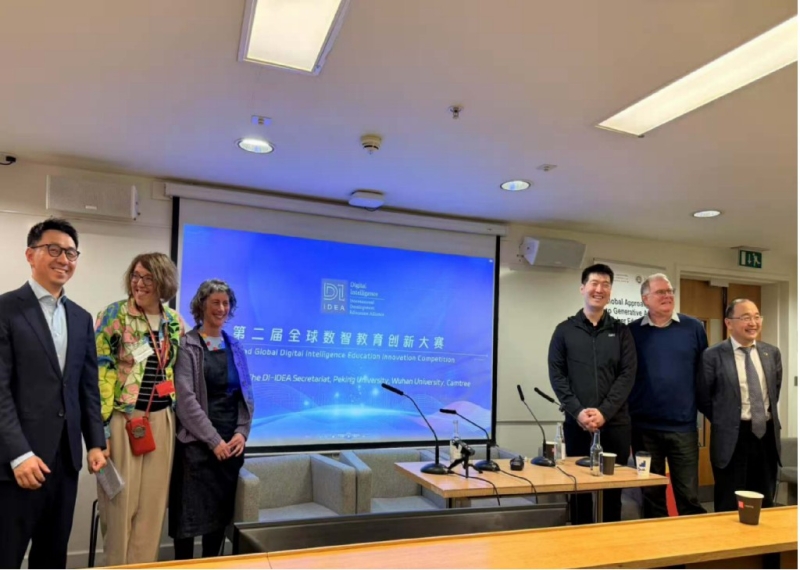
The launch ceremony of the 2nd Global Digital Intelligence Education Innovation Competition
During the release of research reports, Marcos Baretto (Assistant Professor of the Department of Statistics at LSE), Jon Cardoso Silva (Assistant Professor of the Data Science Institute at LSE) and Dorottya Sallai (Associate Professor of the Department of Management at LSE) published their latest results on the application of generative AI in the field of teaching. Martin Compton and Claire Gordon co-published “KCL-LSE Manifesto on the Essay in the Age of AI.” Wajiha Umar (LSE SU Education Sabbatical Officer and Student Working Group Member) shared the “LSE Student Manifesto for Assessment in the Age of AI.”
At the end of the conference, Claire Gordon (Director of the Eden Centre for Education Enhancement at LSE) and Sun Hua (Director of the Center for Excellent Teaching and Learning at PKU) delivered closing remarks respectively. Sun Hua expressed gratitude to LSE for professional conference organization, reviewed the collaborative efforts between LSE and PKU under DI-IDEA, and emphasized that the conference created an effective inter-institutional dialogue mechanism. He outlined DI-IDEA’s 2025 initiatives, which includes four more international academic conferences and four projects: “Faculty AI Literacy Enhancement Program,” “Ethical Boundaries in AI-Powered Pedagogy Research,” “Digital Intelligence Education Framework,” and “Digital Intelligence Education Resource Sharing.” He encouraged member universities to deepen collaboration in these areas and welcomed more international institutions to join DI-IDEA to collectively address the transformative challenges of education in the AI era.
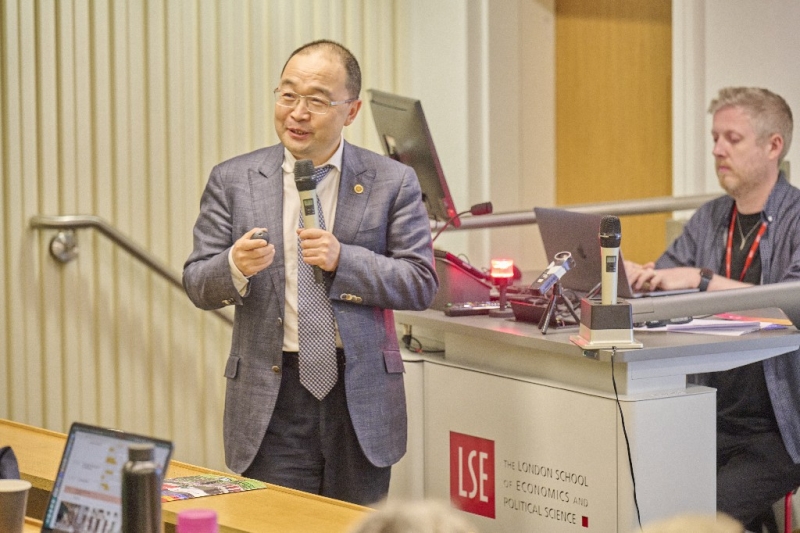
Sun Hua delivered closing remarks
This conference, as the first academic event in the DI-IDEA 2025 annual series showcased PKU’s pragmatic efforts to promote global educational innovation amid AI-driven educational transformation by building a multilateral cooperation platform. PKU Center in Chicago and Beijing Forum Global assisted in organizing the conference.
